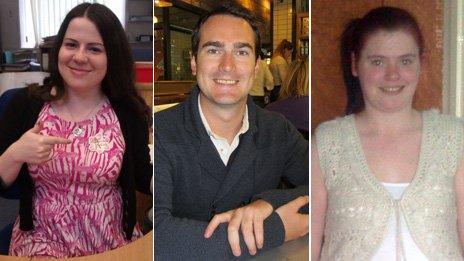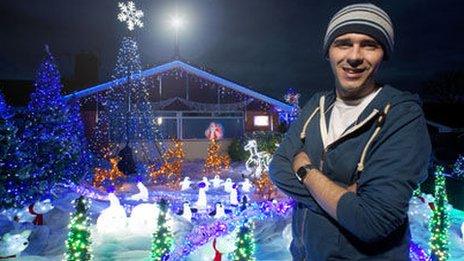Christmas lights causing epilepsy seizures
- Published

Azza Booth said her seizures have increased since Christmas decorations were put up in her neighbourhood
A woman with epilepsy said she has suffered eight seizures this month because of flashing Christmas lights.
Azza Booth, from Nottingham, said she normally has one or two seizures a month but decorations on people's houses and trees trigger her condition.
She said the problem is worse this year and asked people to be more considerate of the health risks.
Epilepsy Action said photosensitive epilepsy is rare but it is safer for people to not use the flash settings.
"A lot of people don't think about it but it's a problem every year," said Miss Booth, who was diagnosed with epilepsy four years ago.
"Strobe lights can look beautiful but so can static ones, and if it is going to be a danger, maybe don't put them up."
There are no regulations around the frequency of flashing Christmas lights, but Epilepsy Action said people can have seizures from lights that flicker between 16 and 25 times a second.
Miss Booth's last seizure happened on a bus driving past a house with Christmas lights.
In the past, she has fractured and broken bones from a seizure and recently damaged her spine - which means she is currently using a wheelchair.
'Praying for January'
She said shopping at this time of year and visiting Christmas markets is also a nightmare.
"When you're epileptic it can get a little bit scary because you can't even walk to the shops without being in fear of turning a corner and there's going to be a really bad one [lights display] that went up last night," she said.
"You get to that point where you're sat there praying for January coming and it can ruin Christmas for you."

Miss Booth said going into Nottingham city centre at this time of year is difficult
Louise Cousins from Epilepsy Action said photosensitive epilepsy - where someone has seizures that are triggered by flashing or flickering lights, or patterns - only affects 3% of people with the condition.
"I can't think of a situation where it is absolutely imperative that Christmas lights should be flashing and flickering," she said.
"So when you think it could be potentially be putting someone's health at risk, it's just safer to not have them flashing at all."

Follow BBC East Midlands on Facebook, external, Twitter, external, or Instagram, external. Send your story ideas to eastmidsnews@bbc.co.uk, external.
- Published7 November 2018

- Published24 November 2017
- Published29 November 2012

- Published6 December 2011
